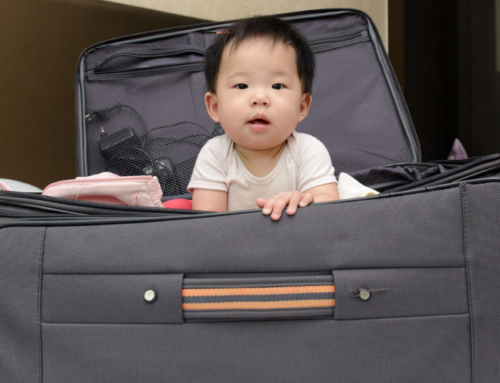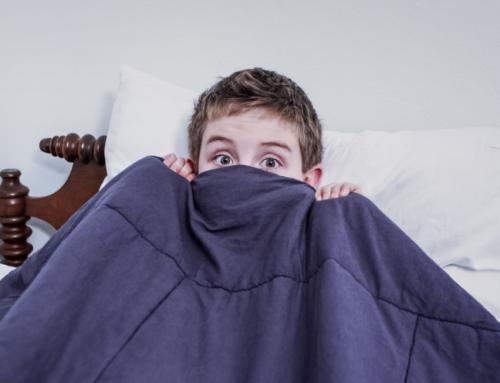Whether you’re a new parent or a seasoned parent with a sleep-challenged little one, the million dollar question is always, ‘when will my baby sleep through the night?’
Infants sleeping through the night is generally the gold standard, at least in Western societies. It is common to hear of parents late night googling ‘when do babies sleep through the night’. I know I did! When my daughter was little I’d frequently compare her sleep to others. ‘How is your little one sleeping?’, I would ask other mum’s. ‘Oh he is such a good baby, he is sleeping through the night’, I’d hear. These conversations always left me feeling like there was something wrong with me and my baby who wasn’t sleeping through the night. It turns out I didn’t need to worry about my daughter’s sleep so much, and here’s why.
What does ‘sleep through the night’ even mean?
I never thought to ask other parents what sleeping through the night looked like for that family. You see ‘sleeping through the night’ is problematic for three reasons.
Firstly, everyone has a different definition of what ‘sleeping through the night’ is. For some families it might mean chunks of 3-5 hours of sleep. For other families it might mean sleeping ‘non-stop’ from bedtime to 6 or 7am in the morning. What does ‘sleeping through the night’ mean for you?
Secondly, no one truly ‘sleeps through the night’. We move back and forth between various sleep stages and have brief states of drowsy wakefulness that we usually don’t remember. As adults we might pull up the blankets, go to the toilet or just roll over and go back to sleep. Researchers have monitored infant sleep with electrodes, actigraphs and continuous video/audio recordings and have found that babies, like adults, experience multiple arousals and awakenings at night. (1) It is at these moments they may signal to parents, and they may be trying to communicate that they are hungry, cold or unwell, for example.
Thirdly, parents are often unaware that their baby is waking. In one study 70% of parents reported their 3 month old as sleeping through the night (defined as periods of 5 hours or more), however video evidence showed a quarter of these infants actually woke and resettled themselves back to sleep without signalling to the parents. (2)
Reframing ‘sleeping through the night’
If ‘sleeping through the night’ means sleeping non-stop, all night, this isn’t what humans do. We need to look at it differently, like ‘sleeping continuously (mostly) without parental intervention’. Now that we’ve reframed the question ‘when will my baby sleep through the night’ to ‘when can I expect mostly continuous sleep without parental intervention’ we can look at what the evidence reveals regarding continuous sleep and night wakings in early life.
Night wakings and stretches of sleep in newborns to 3 months
Babies sleep like babies, not adults. Newborns sleep in short bouts of 30 minutes to 2-4 hours across day and night. Using video evidence, one study in London found that babies at 5 weeks on average slept for a duration of about 2 hours at a time. (2) By 3 months this had increased to 3.5 hours. (2)
Newborns wake easily, in part because they spend a large chunk of their time in a light sleep state (known as active sleep or REM). It is during active sleep you will often see them moving or thrashing about and vocalising with grunts or brief cries; their eyelids flutter and you can hear irregular rapid breathing. Sometimes all the movement and noise of active sleep can seem as if the baby is awake!
While their active sleep and frequent wakings disturb parent’s sleep, it won’t be forever, though when you are in this season it may feel like it will! There is a reason though that babies spend much of their time in active light sleep. It is believed to serve a protective role against SIDS and play a role in brain development. (3, 4)
In addition to the larger amount of active sleep than adults, newborns internal clocks are not synchronized to the 24-hour day. This means they do not know day from night as their circadian rhythm hasn’t developed, and they are unable to produce melatonin (the sleepy hormone). By around 3 months, newborns’ circadian rhythm develops (and continues to mature into the second half of the first year and beyond) and they begin to produce their own melatonin. (1,5) With these changes comes more consolidated night sleep and more wakefulness during the day (1).
Despite the fact that it takes babies time to distinguish day from night, there is a lot we can do to influence circadian development from day one through environmental cues so that it may mature sooner. I’ll talk more about that in another blog post.
Night wakings and stretches of sleep in infants 4 months to 12 months
Maturation of the circadian rhythm and initiation of the hormonal regulation of the sleep-wake cycle (i.e. melatonin) sees infants’ sleep become more adult-like. By around 4 months babies begin to sleep longer and deeper stretches at night, although it is normal for them to still wake up 3-4 times nightly. (6, 7) One study found 50% of 4 month olds woke their parents at least once, generally between midnight and 5am. (8)
If you expect your infant to sleep stretches of six hours or more, a study has found 38% are not able to achieve this at 6 months. (9) More than half (57%) were unable to sleep for 8 hours. (9) Whittingham & Douglas (2014) noted 50% of 6 month olds still signal for their parents during an 8 hour period most nights. Meanwhile Scher et al. (2004) conducted a longitudinal study and found the number of night wakings peaked at 6 months then gradually decreased. Using actigraphs they found 6 month olds only slept continuously for about 72 minutes at a time. Remember though that as shown in the London study not all 6 month olds will signal to their parents on every waking. (2)
In contrast, in another study by Scher (1991) of 118 infants it was found 39% woke at 6 months and then increased to 58% at 9 months and 55% at 12 months. In this study it was at 9 months rather than 6 months that night waking peaked. In a different study that looked at sleep-wake patterns, 9 month olds averaged 3 night wakings. (12)
So you can see within this age group that it is still biologically normal to have night wakings, and it varies as to how often this occurs (some of this may be due to different study designs). It also varies as to how often infants signal for parental assistance to return to sleep. For most families babies in this age group can sleep for 5-6 hour stretches or will wake up and then quietly fall back to sleep on their own. (7) But some little one’s still won’t have a decent 5 hour stretch of sleep without signalling to their parents, even at 12 months. (8) Pennestri et al. (2018) found that 28% of 1 year olds were not sleeping 6 hours straight at night, and 43% were unable to sleep for 8 hours.
With night wakings the norm for this age group, for parents whose little one’s still signal frequently for assistance the focus should be on ensuring everyone gets back to sleep quickly.
Night wakings and stretches of sleep in toddlers – 12 months and beyond
Henderson et al. (2011) reviewed and collated data from a number of studies and found that on average a 1 year olds longest stretch of sleep was about 5.74 hours, with about 72% able to sleep, without parental intervention, for at least 6 hours at night. Another study found 50% of 12-month olds typically require parental assistance to return to sleep after waking. (7)
Schar et al. (2004) found that at 12 months there were on average 2.5 episodes of night waking. At 2 years of age 2 episodes of night waking (defined as longer than 5 minutes) were still common. By 3.5 years of age there was on average one night waking. Night waking, therefore, is still common into the preschool years.
RELATED POST: 5 tips to promote sleep in children

When will my baby need less parental intervention to go back to sleep?
Ok, so I hear you asking, “If it is biologically normal for my baby to arouse or awaken at night, when will they need me less to go back to sleep”?
Your baby can and will learn to handle the night wakings on their own – and quickly and quietly resume sleeping – without waking you up. However, this is not something that can be taught. Sleep is a biological process and babies cannot be ‘trained’ to fall back asleep without parental intervention upon waking. St James-Roberts et al. (2015) found that infant resettling is an autonomous process – it is just something that happens and further research is needed into this process.
So as to when they will signal less for parental help, research shows it begins around the 3-4 month mark. As the circadian rhythm matures infants can sleep for longer periods and while they may wake up during this time they also may be able to return to sleep without parental intervention, but many cannot and will signal to their parents. An interesting finding in the St James-Roberts et al. (2015) study was that sleep length was accompanied by increased sucking of hands or fingers. Researchers speculated that infants may use suckling as a self-regulation strategy to prolong or initiate sleep. It would be interesting to see more research conducted on this and whether swaddling and restricting babies access to their hands is impeding this natural self-regulation process.
Even though parents can expect longer stretches of sleep to begin from the 3-4 month mark, another study found that at 18 months night-time settling required more parental input. (14) It is not known though whether researchers looked at the quantity of daytime sleep in the 18 month olds that required more parental assistance at night. Sleep biology would suggest that a larger amount of sleep pressure at night would result in longer stretches of night sleep and potentially rousing, but quickly resuming sleep without parental assistance.
If my baby wakes at night will it affect their development?
Research has found no association between sleeping through the night and mental and psychomotor development. The developmental outcomes of an infant that ‘sleeps through the night’ versus one that doesn’t appear to be the same. (15, 16, 17)
Throughout a baby’s early years there are huge growth and developmental milestones such as walking and crawling which are known to disrupt sleep. (1) Unseen, but often having a huge impact on parents’ sleep, are the significant developmental changes in sleep patterns. Newborns begin life spending 50% of their night in active REM sleep. By 3 months it begins to mature to adult-like sleep and by 12 months it has significantly matured and resembles what will be seen at 3 years. (1) Shifts in sleep quality – often labelled as sleep regressions – can be linked to brain development and neurobiological maturation and the increased wakings, for example at 6 months of age, may mark developmental change. (1) It is not a sleep regression but rather a progression.
When should I be concerned about night wakings?
There is a difference between developmentally normal night waking and excessive night waking. According to Dr Pamela Douglas at Possums & Co, infants waking every 45 minutes to 1.5 hours night after night indicates something is going on that may require investigation. The older child should be able to have longer stretches of night sleep with minimal night waking, however, if you are seeing a pattern of frequent waking night after night further investigation may be warranted.
A pattern of frequent night waking may be due to disruption of the biological sleep regulators such as the circadian clock. Or it could be due to a medical condition or even an infection brewing, or there may be unidentified feeding problems. If you are seeing a pattern of frequent excessive waking night after night, it may be worth having a conversation with a health professional.
Babies sleeping through the night – a summary of the evidence
The research to answer the million dollar question ‘when will my baby sleep through the night?’ shows night waking’s are common in infancy and early childhood. What can also be seen though is a trend towards reduced night waking across the first three years of life, and less signalling for parental intervention. In understanding that night waking’s are biologically normal, and for our little ones serves a protective function, instead of seeking to eliminate all night waking through sleep training we can instead focus on how to best support our little ones and parents back to sleep quickly after waking, so that everyone gets a decent nights sleep.
For educational purposes only. If you suspect you have a medical problem, please see a physician.
All the links in this blog are completely unsponsored and contain no affiliate payments. I just like to mention quality resources and/or other health professionals I know and recommend.
References
(1) Scher, A., Epstein, R., & Tirosh, E. (2004) Stability and changes in sleep regulation: A longitudinal study from 3 months to 3 years. International Journal of Behavioral Development, 28(3):268-274. https://doi.org/10.1080/01650250344000505
(2) St James-Roberts, I., Roberts, M., Hovish, K., & Owen, C. (2015). Video evidence that London infants can resettle themselves back to sleep after waking in the night, as well as sleep for long periods, by 3 months of age. Journal of developmental and behavioral pediatrics, 36(5), 324–329. https://doi.org/10.1097/DBP.0000000000000166
(3) Heraghty, J. L., Hilliard, T. N., Henderson, A. J., & Fleming, P. J. (2008). The physiology of sleep in infants. Archives of Disease in Childhood, 93(11), 982. http://dx.doi.org/10.1136/adc.2006.113290
(4) Siegel, J. M. (2005). Functional implications of sleep development: E178. PLoS Biology, 3(5), e178. https://doi.org/10.1371/journal.pbio.0030178
(5) Rivkees, S. A. (2003). Developing Circadian Rhythmicity in Infants. Pediatrics, 112(2), 373–381. https://doi.org/10.1542/peds.112.2.373
(6) Douglas, P. S., & Hill, P. S. (2013). Behavioral sleep interventions in the first six months of life do not improve outcomes for mothers or infants: A systematic review. Journal of Developmental and Behavioral Pediatrics, 34(7), 497–507. https://doi.org/10.1097/DBP.0b013e31829cafa6
(7) Goodlin-Jones, B. L., Burnham, M. M., Gaylor, E. E., & Anders, T. F. (2001). Night waking, sleep-wake organization, and self-soothing in the first year of life. Journal of Developmental and Behavioral Pediatrics, 22(4), 226–233. https://doi.org/10.1097/00004703-200108000-00003
(8) Henderson, J. M., France, K. G., Owens, J. L., & Blampied, N. M. (2010). Sleeping through the night: The consolidation of self-regulated sleep across the first year of life. Pediatrics, 126(5), e1081–e1087. https://doi.org/10.1542/peds.2010-0976
(9) Pennestri, M. H., Laganière, C., Bouvette-Turcot, A. A., Pokhvisneva, I., Steiner, M., Meaney, M. J., Gaudreau, H., & Mavan Research Team (2018). Uninterrupted Infant Sleep, Development, and Maternal Mood. Pediatrics, 142(6), e20174330. https://doi.org/10.1542/peds.2017-4330
(10) Whittingham, K., & Douglas, P. (2014). Optimizing parent–infant sleep from birth to 6 months: A new paradigm. Infant Mental Health Journal, 35(6), 614–623. https://doi.org/10.1002/imhj.21455
(11) Scher, A. (1991). A longitudinal study of night waking in the first year. Child: care, health and development, 17(5), 295–302. https://doi.org/10.1111/j.1365-2214.1991.tb00699.x
(12) Anders, T. F., & Keener, M. (1985). Developmental course of nighttime sleep-wake patterns in full-term and premature infants during the first year of life. I. Sleep, 8(3), 173–192. https://doi.org/10.1093/sleep/8.3.173
(13) Henderson, J. M., France, K. G., & Blampied, N. M. (2011). The consolidation of infants’ nocturnal sleep across the first year of life. Sleep medicine reviews, 15(4), 211–220. https://doi.org/10.1016/j.smrv.2010.08.003
(14) Armstrong, K. L., Quinn, R. A., & Dadds, M. R. (1994). The sleep patterns of normal children. The Medical journal of Australia, 161(3), 202–206. https://doi.org/10.5694/j.1326-5377.1994.tb127383.x
(15) Price, A. M., Wake, M., Ukoumunne, O. C., & Hiscock, H. (2012). Outcomes at six years of age for children with infant sleep problems: Longitudinal community-based study. Sleep Medicine, 13(8), 991–998. https://doi.org/10.1016/j.sleep.2012.04.014
(16) Mindell, J. A., & Lee, C. (2015). Sleep, mood, and development in infants. Infant Behavior & Development, 41, 102–107. https://doi.org/10.1016/j.infbeh.2015.08.004
(17) Price, A. M., Quach, J., Wake, M., Bittman, M., & Hiscock, H. (2015). Cross-sectional sleep thresholds for optimal health and well-being in Australian 4–9-year-olds. Sleep Medicine, 22, 83–90. https://doi.org/10.1016/j.sleep.2015.08.013







Leave A Comment